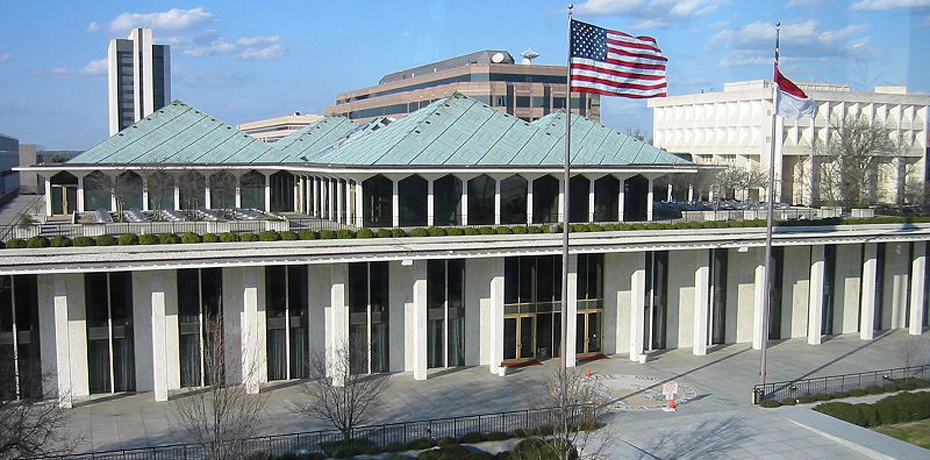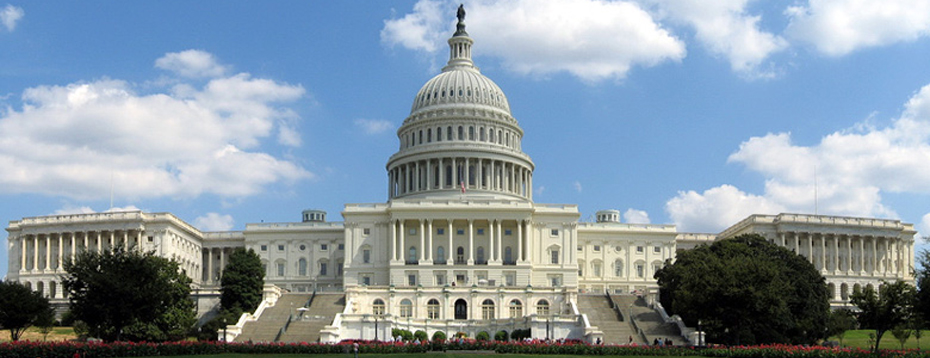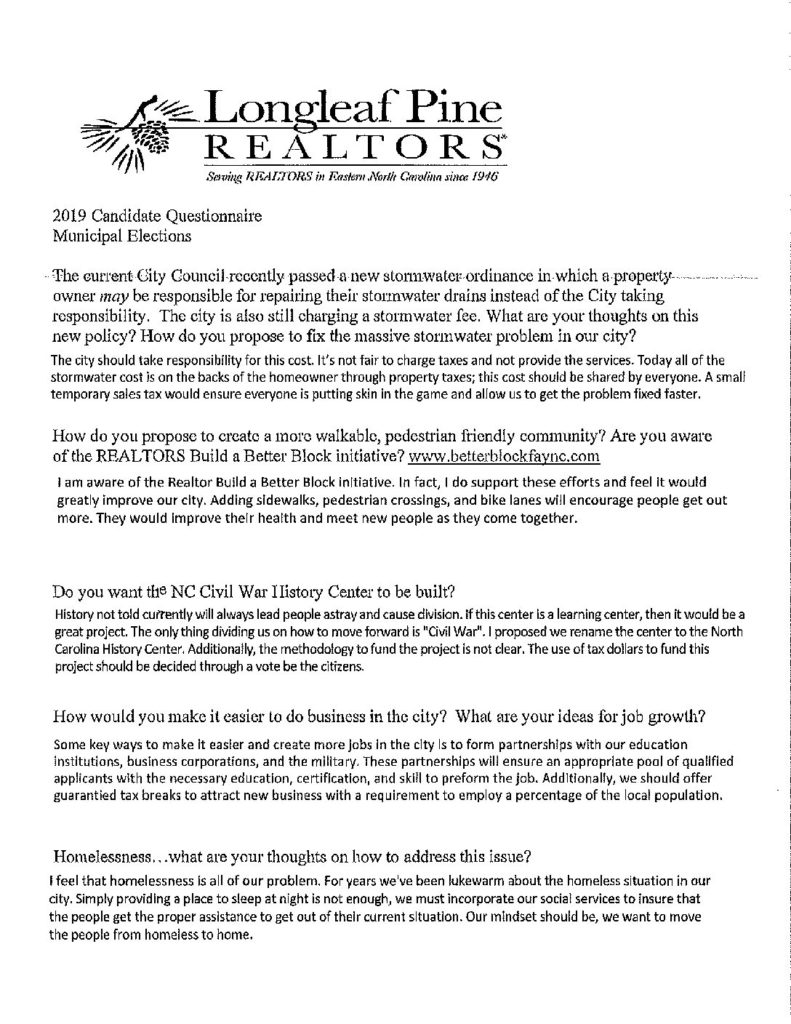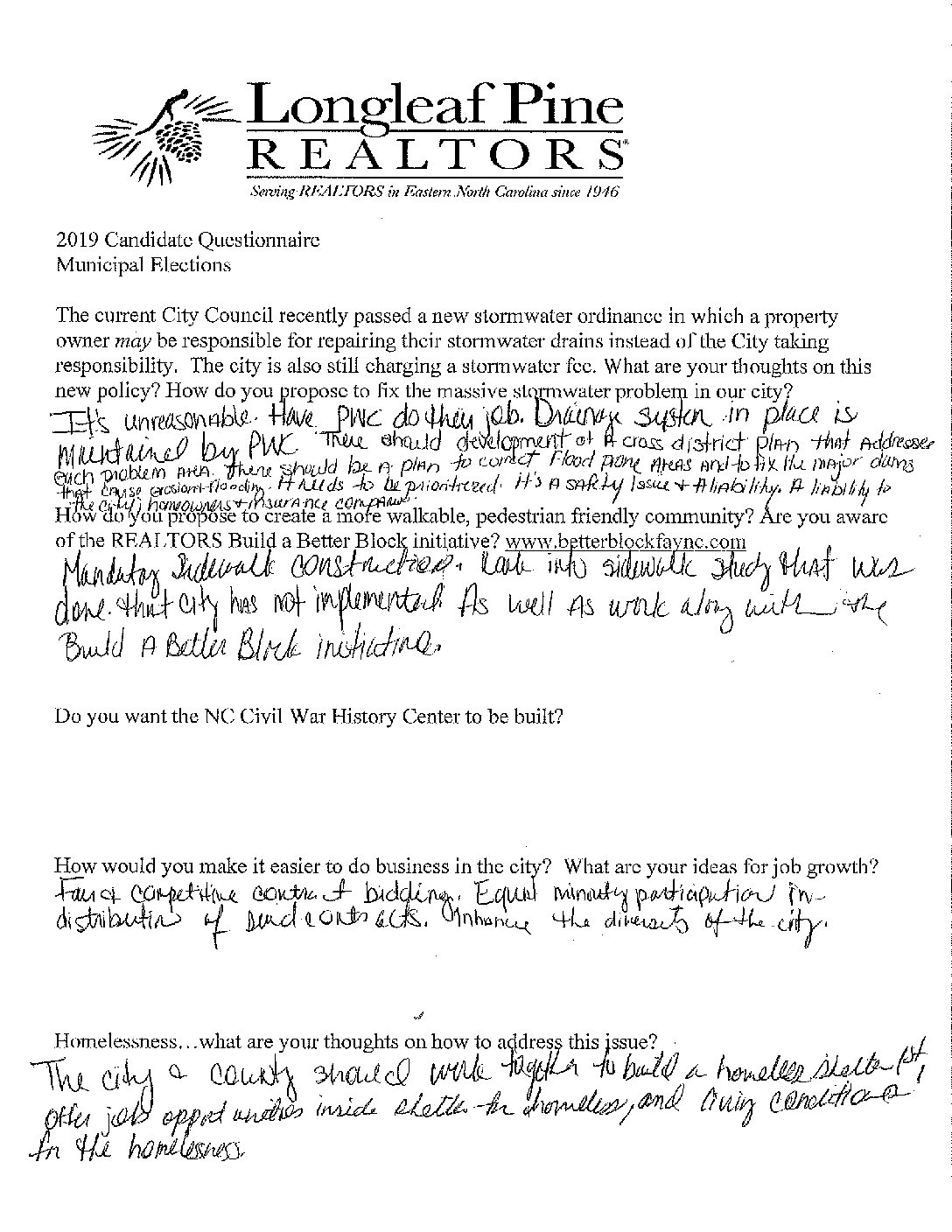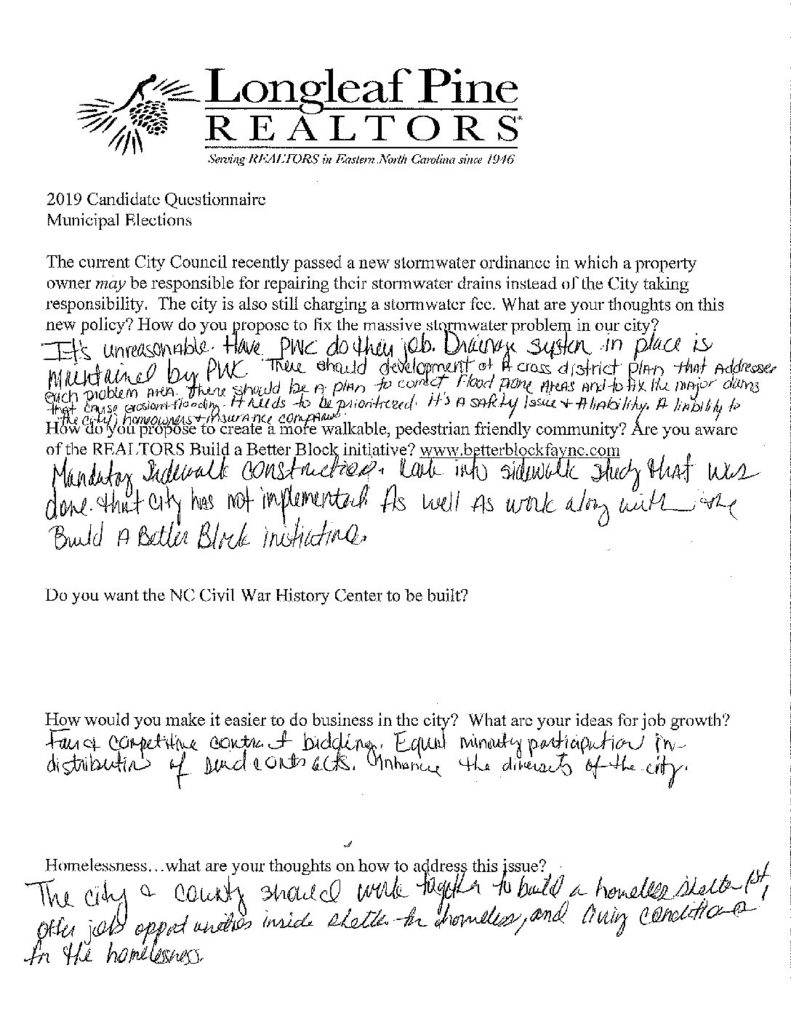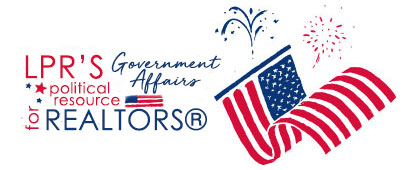Candidate Full Name: Theodore W. Mohn (Ted Mohn)
Daytime Phone Number: (910) 495-3634
E-Mail: tmohn@aol.com
Current Occupation Position: Retired
Previously
Elected/Appointed Positions: Elected
to City Council District 8 in Nov 2007, 2009, 20013, 2015 & 2017. Currently also serve as Mayor Pro Tem. I did not run for election/reelection in 2011
due to family reasons being a single parent.
Community
Involvement: I
Initially became involved in late 2004 upon my retirement from the U.S. Army because
of the Big-Bang Annexation and have remained totally involved with our
collective community.
Community
Endorsements: Citizens
of Fayetteville and district 8 have endorsed me by electing me the five times I
have previously ran for election.
Do You Have and
Active Campaign Account? Yes (Ted
Mohn for City Council)
Do You Accept
PAC Checks? Yes
QUESTION
1: The current City Council recently
passed a new stonnwater ordinance in which a property owner may be
responsible
for repairing their stonnwater drains instead of the City taking
responsibility. The city is also still charging a
stonnwater
fee. What are your thoughts on this new policy? How do you propose to fix the
massive stonnwater problem
in
our city?
City Council recently appropriated 1.8 Million
Dollars (Drainage Assistance Program) in our current budget for off-right-of-way
drainage improvements on private residential properties that connect to our
in-right-of-way stormwater drainage systems.
We are the only large city in North Carolina doing this. We’ve also hired Gradient (Gordan Rose’s
Team) to help evaluate these off-right-of-way drainage complaints and also help
inspect our approximately one hundred and thirty (130) Stormwater Control
Measures (SCM’s – formerly referred to as BMPs). All of these off-right-of-way structures are
important aspects of our overall stormwater infrastructure throughout our City.
As the City continues to study the various water
basins across our City additional projects will be identified that need to be
addressed. To be able to pay for these improvements
I support a voter approved stormwater infrastructure revenue bond referendum
similar to the Parks & Recreation Bond Referendum. The reoccurring revenue stream to pay off the
bond would be from the existing stormwater fund and not an increase in property
taxes.
QUESTION 2: How do you propose to create a more walkable,
pedestrian friendly community? Are you aware of the
REALTORS Build a
Better Block initiative? www.betterblockfaync.com
I
am very familiar with the Build a Better Block Initiative. The one in Haymont lead to NCDOT approving
and paying for
the
for the installation of a pedestrian (protected) crosswalk near the Cape Fear
Regional Theater. The one next Spring on
Murchison Road by Fayetteville State University will help guide NCDOT and their
planned improvements to the southern end of Murchison Road. Some plans include reducing the speed limit
from Langdon Street to Rowan Street, narrowing traffic flow to one lane in each
direction, add on-street parking, adding bike lanes and having a protected
center median for additional pedestrian safety.
As
a ten-year member of the Fayetteville Area Metropolitan Planning Organization’s
(FAMPO’s) Transportation Policy Board (TPB) we’ve allocated hundreds of thousands
of dollars requiring a small local match over the past ten years for improved
walkability across our City. This
includes miles of sidewalks, walking trails, protected pedestrian crosswalks,
improved streetscapes, an upcoming study to potentially have a trail along
Cross Creek from Rowan Street all the North to Fort Bragg and other walkability
options for our City.
If
reelected to City Council I will continue to serve on the TPB to help bring
Federal and State Transportation dollars to our City to continue improving our
walkability and bike options.
QUESTION
3: Do you want the NC Civil War History
Cenrter to be built?
Yes. I voted to support this project in December
2016 and remain committed to the potential economic development and Educational
aspects of this project as presented.
The foundation along with City, County and State level elected officials
must ensure trust across our City that this History Center will tell all sides
of this point in our NC history.
We
must better embrace our African American citizens to ensure they feel
comfortable and supportive of the History Center’s mission and dedication to
telling their story. This has been done
to some level but the Center’s personnel need to continue going out to
community watch meetings to explain the process/research do date and their
commitment to ensure additional citizen engagement through the Center’s construction,
initial operation and future operation.
QUESTION
4: How would you make it easier to do business
in the city? What are your ideas for job growth?
Since
coming back on City Council in December 2013 the City Council has worked with
the broader development community to continue updating the Unified Development
Ordinance (UDO) and stormwater ordinance.
I know with the passage of the UDO this would be a living and breathing
document subject to updates in the decades ahead. Updates indeed have been occurring over the
past several years.
Our
unemployment rate has declined over the past several years due to numerous new
businesses coming to our major NCDOT corridors.
New apartments and houses continue to be built and we need to continue
our residential development based on demand.
Large areas of land in Western Fayetteville are ripe for residential and
commercial development and the I-295 extension south of Cliffdale Road and
Raeford Road will make the surrounding lands more appealing for new
development.
The
Campbell Soup Distribution Center is currently operating at initial/partial
capacity and should be fully operating with close to 200 new jobs by next
summer. These are the type of new
projects we need to continue encouraging to come into our City. We must continue working with the County and
the Fayetteville Cumberland County Economic Development Corporation (FCEDC) to
continue recruiting new businesses and new jobs into our community. The process is in place and we need to be
successful with our City policies/ordonnances to encourage new growth and
infill developments.
QUESTION
5: Homelessness … what are your
thoughts on how to address this issue?
Homelessness
in Fayetteville will never truly be eliminated because it’s a revolving
door. Some get help and others then fall
into homelessness. Cumberland County is
the State of NC designated lead for Health and Human Services which
homelessness and individual root causes are part of the County’s
responsibilities. No two homeless
persons stories are identical. With that
said the City Council and County Commissioners need to do a much better job
directing their Senior Management Teams to propose actual programs with a
funding source designed to treat the root causes of homelessness.
The
best solution in my personal opinion is to get our homeless population in
direct contact with their immediate and/or extended family members to see if
they can be reunited because family support is the best kind of support
available in most cases. Where this is
not possible, we need to continue working with our non-profits that already
provide support services to our homeless population to see what can be done to
help our homeless secure safe affordable housing to help them on their road to
recovery and out of homelessness. We
have some of the best fed homeless citizens in the country because of the many gracious
organizations helping with food and basic life necessities. While admirable this is simply a bridge for
our homeless population’s day-to-day existence versus addressing the symptom(s)
and causes(s) to their homelessness. I
do thank these private entities for their efforts and compassion. They are truly helping keep some of our
homeless population alive.
Our
Cumberland County Commissioners must step-up and boldly take the lead once and
for all with a county-wide plan so Fayetteville, Hope Mills, Spring Lake and
our other municipalities can be in a supportive role and a collective part of
any future solution to reducing our County’s homeless population.

